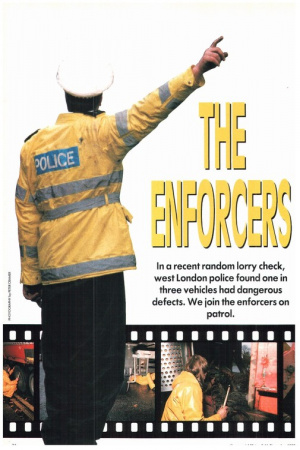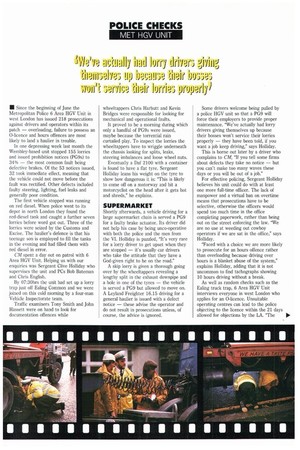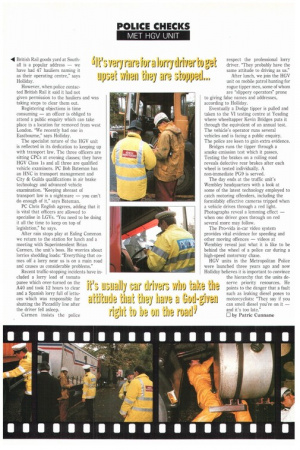In a recent random lorry check, west London police found
Page 26

Page 27

Page 28

If you've noticed an error in this article please click here to report it so we can fix it.
one in three vehicles had dangerous defects. We join the enforcers on patrol.
• Since the beginning of June the Metropolitan Police 6 Area HGV Unit in west London has issued 218 prosecutions against drivers and operators within its patch — overloading, failure to possess an 0-licence and hours offences are most likely to land a haulier in trouble.
In one depressing week last month the Wembley-based unit stopped 155 lorries and issued prohibition notices (PG9s) to 34% — the most common fault being defective brakes. Of the 53 notices issued, 32 took immediate effect, meaning that the vehicle could not move before the fault was rectified. Other defects included faulty steering, lighting, fuel leaks and generally poor condition.
The first vehicle stopped was running on red diesel. When police went to its depot in north London they found the red-diesel tank and caught a further seven lorries before word got out. Three of the lorries were seized by the Customs and Excise. The haulier's defence is that his teenage son is employed to fill the tanks in the evening and had filled them with red diesel in error.
CM spent a day out on patrol with 6 Area HGV Unit. Helping us with our enquiries was Sergeant Clive Holliday who supervises the unit and PCs Bob Bateman and Chris English.
By 07:30hrs the unit had set up a lorry trap just off Ealing Common and we were joined on this cold morning by a four-man Vehicle Inspectorate team.
Traffic examiners Tony Smith and John Hassett were on hand to look for documentation offences while wheeltappers Chris Harbutt and Kevin Bridges were responsible for looking for mechanical and operational faults.
It proved to be a morning during which only a handful of PG9s were issued, maybe because the torrential rain curtailed play. To inspect the lorries the wheeltappers have to wriggle underneath the chassis looking for splits, leaks, steering imbalances and loose wheel nuts.
Eventually a Daf 2100 with a container is found to have a flat tyre. Sergeant Holliday leans his weight on the tyre to show how dangerous it is: "This is likely to come off on a motorway and hit a motorcyclist on the head after it gets hot and shreds," he explains.
SUPERMARKET
Shortly afterwards, a vehicle driving for a large supermarket chain is served a PG9 for a faulty brake actuator. Its driver did not help his case by being unco-operative with both the police and the men from the VI. Holliday is puzzled, "It's very rare for a lorry driver to get upset when they are stopped — it's usually car drivers who take the attitude that they have a God-given right to be on the road."
A skip lorry is given a thorough going over by the wheeltappers revealing a lengthy split in the exhaust downpipe and a hole in one of the tyres — the vehicle is served a PG9 but allowed to move on. A Leyland Freighter 16.15 driving for a general haulier is issued with a defect notice — these advise the operator and do not result in prosecutions unless, of course, the advice is ignored. Some drivers welcome being pulled by a police HGV unit so that a PG9 will force their employers to provide proper maintenance. "We've actually had lorry drivers giving themselves up because their bosses won't service their lorries properly — they have been told, if you want a job keep driving," says Holliday.
This is borne out later by a driver who complains to CM, "If you tell some firms about defects they take no notice — but you can't make too many waves these days or you will be out of a job."
For effective policing, Sergeant Holliday believes his unit could do with at least one more full-time officer. The lack of manpower and a virtual ban on overtime means that prosecutions have to be selective, otherwise the officers would spend too much time in the office completing paperwork, rather than being out on the street enforcing the law. "We are no use at weeding out cowboy operators if we are sat in the office," says Holliday.
"Faced with a choice we are more likely to prosecute for an hours offence rather than overloading because driving over hours is a blanket abuse of the system," explains Holliday, adding that it is not uncommon to find tachographs showing 10 hours driving without a break.
As well as random checks such as the Ealing truck trap, 6 Area HGV Unit interviews everyone in west London who applies for an 0-licence. Unsuitable operating centres can lead to the police objecting to the licence within the 21 days allowed for objections by the LA. "The British Rail goods yard at Southall is a popular address — we have had 47 hauliers naming it as their operating centre," says Holliday.
However, when police contacted British Rail it said it had not given permission to the hauliers and was taking steps to clear them out.
Registering objections is time consuming — an officer is obliged to attend a public enquiry which can take place in a location far removed from west London. "We recently had one in Eastbourne," says Holliday.
The specialist nature of the HGV unit is reflected in its dedication to keeping up with transport law. The three officers are sitting CPCs at evening classes; they have HGV Class Is and all three are qualified vehicle examiners. PC Bob Bateman has an HNC in transport management and City & Guilds qualifications in air brake technology and advanced vehicle examination. "Keeping abreast of transport law is a nightmare — you can't do enough of it," says Bateman.
PC Chris English agrees, adding that it is vital that officers are allowed to specialise in LGVs. "You need to be doing it all the time to keep on top of legislation," he says.
After rain stops play at Ealing Common we return to the station for lunch and a meeting with Superintendent Brian Carmen, the unit's boss. He worries about lorries shedding loads: "Everything that comes off a lorry near us is on a main road and causes us considerable problems."
Recent traffic-stopping incidents have included a lorry load of tomato puree which over-turned on the A40 and took 12 hours to clear and a Spanish lorry full of lettuces which was responsible for shutting the Piccadilly line after the driver fell asleep.
Carmen insists the police respect the professional lorry driver. "They probably have the same attitude to driving as us."
After lunch, we join the HGV unit on mobile patrol hunting for rogue tipper men, some of whom are "slippery operators" prone to giving false names and addresses, according to Holliday.
Eventually a Dodge tipper is pulled and taken to the VI testing centre at 'leading where wheeltapper Kevin Bridges puts it through the equivalent of an annual test. The vehicle's operator runs several vehicles and is facing a public enquiry. The police are keen to gain extra evidence.
Bridges runs the tipper through a smoke emission test which it passes. Testing the brakes on a rolling road reveals defective rear brakes after each wheel is tested individually. A non-immediate PG9 is served.
The day ends at the traffic unit's Wembley headquarters with a look at some of the latest technology employed to catch motoring offenders, including the formidably effective cameras tripped when a vehicle drives through a red light. Photographs reveal a lemming effect — when one driver goes through on red several more may follow.
The Pro-vida in-car video system provides vital evidence for speeding and other moving offences — videos at Wembley reveal just what it is like to be behind the wheel of a police car during a high-speed motorway chase.
HGV units in the Metropolitan Police were launched three years ago and now Holliday believes it is important to convince the hierarchy that the units deserve priority resources. He points to the danger that a fault such as leaking diesel poses to motorcyclists: They say if you can smell diesel you're on it — and it's too late."
El by Patric Cunnane












































































